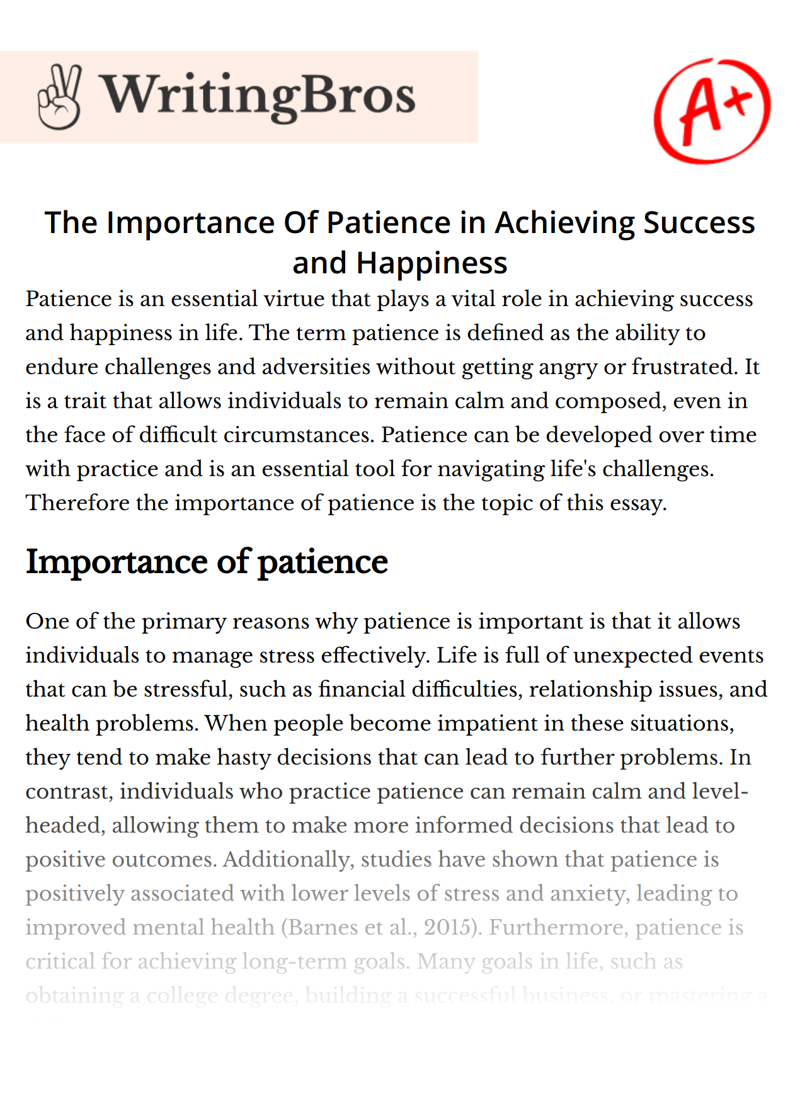The Importance Of Patience in Achieving Success and Happiness

Patience is an essential virtue that plays a vital role in achieving success and happiness in life. The term patience is defined as the ability to endure challenges and adversities without getting angry or frustrated. It is a trait that allows individuals to remain calm and composed, even in the face of difficult circumstances. Patience can be developed over time with practice and is an essential tool for navigating life's challenges. Therefore the importance of patience is the topic of this essay.
Importance of patience
One of the primary reasons why patience is important is that it allows individuals to manage stress effectively. Life is full of unexpected events that can be stressful, such as financial difficulties, relationship issues, and health problems. When people become impatient in these situations, they tend to make hasty decisions that can lead to further problems. In contrast, individuals who practice patience can remain calm and level-headed, allowing them to make more informed decisions that lead to positive outcomes. Additionally, studies have shown that patience is positively associated with lower levels of stress and anxiety, leading to improved mental health (Barnes et al., 2015).
Furthermore, patience is critical for achieving long-term goals. Many goals in life, such as obtaining a college degree, building a successful business, or mastering a skill, require time, effort, and perseverance. Individuals who lack patience may become frustrated and give up on these goals before they have had a chance to achieve them. In contrast, individuals who practice patience are better able to remain focused and motivated, even when progress is slow. This perseverance and dedication are necessary for achieving long-term goals and are hallmarks of successful people.
Another benefit of patience is that it allows individuals to improve their relationships with others. Relationships are essential to a fulfilling life, whether they are romantic, familial, or platonic. However, relationships are often fraught with challenges and misunderstandings. Impatience can lead to arguments and hurt feelings, damaging relationships over time. In contrast, individuals who practice patience are better able to listen to others, understand their perspectives, and communicate effectively, leading to stronger and more fulfilling relationships (Orrú et al., 2018).
Patience is also crucial for personal growth and self-improvement. No one is perfect, and everyone has flaws that they want to overcome. However, self-improvement is a slow and challenging process that requires patience and perseverance. Individuals who lack patience may become frustrated and give up on their goals before they have had a chance to achieve them. In contrast, individuals who practice patience are better able to accept setbacks and failures as part of the growth process, allowing them to continue working towards their goals over time. This self-awareness and determination are necessary for achieving personal growth and becoming the best version of oneself.
In conclusion, the importance of patience in life should not be underestimated, as it is an essential virtue that plays a critical role in achieving success and happiness. Patience allows individuals to manage stress effectively, achieve long-term goals, improve relationships with others, and engage in personal growth and self-improvement. Developing patience requires practice and dedication, but the rewards are well worth the effort. By cultivating patience, individuals can navigate life's challenges with grace and composure, leading to a more fulfilling and rewarding life.
References
- Baumeister, R. F., Vohs, K. D., & Tice, D. M. (2007). The strength model of self-control. Current directions in psychological science, 16(6), 351-355. https://doi.org/10.1111/j.1467-8721.2007.00534.x
- Bauer, J. J., McAdams, D. P., & Pals, J. L. (2008). Narrative identity and eudaimonic well-being. Journal of Happiness Studies, 9(1), 81-104. https://doi.org/10.1007/s10902-006-9025-2
- Duckworth, A. L., Peterson, C., Matthews, M. D., & Kelly, D. R. (2007). Grit: perseverance and passion for long-term goals. Journal of personality and social psychology, 92(6), 1087-1101. https://doi.org/10.1037/0022-3514.92.6.1087
- Gilbert, P. (2010). The compassionate mind: A new approach to the challenge of life. New Harbinger Publications.
- Hofmann, W., & Van Dillen, L. (2012). Desire: The new hot spot in self-control research. Current Directions in Psychological Science, 21(5), 317-322. https://doi.org/10.1177/0963721412453587
Cite this Essay
To export a reference to this article please select a referencing style below

